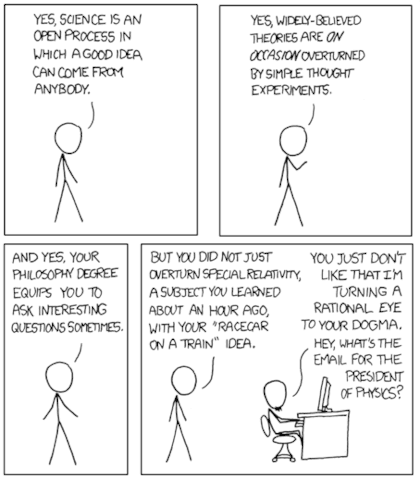Thoughts on the Complexity of Modern Science
Science today is incredibly complex. Anyone who ever did scientific research knows that, but many in the general public seem to be completely unaware of this. I think this is a point where science communication can improve.
- “I listened to some science TV show, and now I have come up with my theory.”
This could have a chance if the TV show would fully cover the topic. It does not.
- “Scientists don’t know detail X, therefore they know nothing.”
- “Scientists were once wrong in point Y, therefore we cannot trust any result.”
Frequently seen as a response to scientific arguments against various crackpottery.

It is not that easy. From xkcd
If you are unaware that theories are backed up by hundreds to thousands of measurements, each based on various other publications and often years of research covering tons of details and various cross-checks, then those misconceptions can come up. Can we do something against that?
When I get asked what I am working on in particle physics, I always try to give both the overview but also an impression of daily work: Yes, the long-term task can be something like the search for new particles. But what you do is more like calibrating the response of some detector part to particles at different detector temperatures, different radiation damage, or one of the hundreds of other tasks involved in the overall publication that produces one round of news in the popular press (if you are lucky). I’m not sure how that can be translated to TV shows, newspapers, and so on. “We search for new particles” sounds much more interesting than “I’m working on some tiny detail of the search”. But then the news reports “scientists looked for new particles”, drop one or two names of leading scientists, and it gives the impression scientists would “search for new particles” all day.
Another aspect: Science taught in school is often very basic – Newtonian physics for example is very simple compared to more recent theories. You cannot start with quantum field theory, obviously, but if you see Newtonian physics only you could assume quantum field theory is similar to the way Newtonian physics is taught: Do one or two experiments and then write down a few formulas. If that would be true, then sure, be very skeptical. But it is not true.
This is also related to funding: if you don’t understand the complexity of modern science, you don’t understand why experiments can cost billions of Euros/Dollars. Funding decisions are not made directly by popular vote, but public opinion does influence science funding in general.
What do you think? Can science popularisation improve in that aspect, and if yes, how?
Working on a PhD for one of the LHC experiments. Particle physics is great, but I am interested in other parts of physics as well.








[QUOTE=”Hornbein, post: 5350823, member: 489043″]Once on the History channel was a show about the US Navy teleporting a destroyer in the vicinity of New York City. We were told that this was a consequence of Albert Einstein’s Unified Field Theory.[/QUOTE]
Yup, the show was aired on the History Channel’s … [URL=’https://en.wikipedia.org/wiki/History’s_Mysteries#Season_unknown’] History’s Mysteries[/URL]… Yuck!
It was about The[URL=’https://en.wikipedia.org/wiki/Philadelphia_Experiment’] [B]Philadelphia Experiment[/B][/URL] …
Lol…
[QUOTE]I thought that that was sinking very low.[/QUOTE]
[QUOTE=”anorlunda, post: 5350859, member: 455902″]”The term popular science includes both.”[/QUOTE]Ah … then that’s where we disagree.
EDIT: And by the way, there was no need to be rude about it.
[QUOTE=”phinds, post: 5350808, member: 310841″]I can only repeat: I don’t consider PF to be on a par w/ the History Channel. If you do, then we’ll have to agree to disagree.[/QUOTE]
Don’t be so dense. Reread #114 and #117. It is clear that I do not consider them on a par. I object to overly broad speech that would lump them together.
I’ll say it one more time in language that I hope penetrates. “History channel bad.” “PF good.” “The term popular science includes both.”
[QUOTE=”phinds, post: 5350808, member: 310841″]I can only repeat: I don’t consider PF to be on a par w/ the History Channel. If you do, then we’ll have to agree to disagree.[/QUOTE]
Once on the History channel was a show about the US Navy teleporting a destroyer in the vicinity of New York City. We were told that this was a consequence of Albert Einstein’s Unified Field Theory.
I thought that that was sinking very low.
[QUOTE=”anorlunda, post: 5350779, member: 455902″]That’s my point. Blanket condemnation of popular science is far too broad because it sweeps up things like PF also. If you don’t like history channel, say you don’t like history channel, not that you don’t like popular science.[/QUOTE]
I can only repeat: I don’t consider PF to be on a par w/ the History Channel. If you do, then we’ll have to agree to disagree.
[QUOTE=”phinds, post: 5350720, member: 310841″]I don’t consider PF to be on a par w/ the History Channel. We deal in facts, whether presented with the math or not. They deal in crap. But REALLY pretty crap.[/QUOTE]
That’s my point. Blanket condemnation of popular science is far too broad because it sweeps up things like PF also. If you don’t like history channel, say you don’t like history channel, not that you don’t like popular science.
To add to phinds’ last reply, I feel that in general even high level explanations come with the footnote that it is only an approximation (usually) on PF.
An example is the all-time favourite of representing spacetime as a rubber sheet with masses on that sheet.
While there is merit to this model its often shown in the relativity forum that people take it outside its region of application.
Not only do other members mention this, they try to explain why it doesn’t work.
Depending on the level the poster requires this can include a more mathematical treatment.
That’s the big difference with standard pop science on TV and other media, they pretty much deal in absolutes.
I don’t consider
[QUOTE=”anorlunda, post: 5350701, member: 455902″]By some definitions PF could be define as pop science. People get mostly verbal answers here without much math, and without being told “take the whole course.” I don’t presume that to be lamentable, do you?
On the other hand, I do believe that many laymen spent far more time and effort to understand physics [I]sans[/I] math, than it would take them to learn math and physics courses the conventional way.[/QUOTE]
I don’t consider PF to be on a par w/ the History Channel. We deal in facts, whether presented with the math or not. They deal in crap. But REALLY pretty crap.
By some definitions PF could be define as pop science. People get mostly verbal answers here without much math, and without being told “take the whole course.” I don’t presume that to be lamentable, do you?
On the other hand, I do believe that many laymen spent far more time and effort to understand physics [I]sans[/I] math, than it would take them to learn math and physics courses the conventional way.
[QUOTE=”Garlic, post: 5350592, member: 543915″]If science videos on (for example) youtube diddn’t just “feed” the audiance with easy information, and gave the overview as well as deeper informations on the subject, it would be much better.[/QUOTE]Sure, it would be better. So what? It ISN’T better and it isn’t going to GET better, so actually, all the talking we do about it is just us talking to each other and has no effect on anything. I emphasize the “and won’t” part of my original post. Yep, it’s frustrating all right.
[QUOTE=”phinds, post: 5340420, member: 310841″]I think the biggest problem is that people find it SO much easier to watch pop science on TV than to do any actual study of science, and you know how those shows get so much wrong. I think they do sometimes inspire young people to study but overall I’m not sure but what they do more harm than good and they certainly give those adults who are not likely to further pursue actual science a very poor view of actual science of the kind you talk about. The producers of the TV shows can’t be blamed for this any more than McDonalds can be blamed for serving tasty junk food. People sell what other people buy and there are lots of buyers for junk food and junk science, especially since they LOOK so tasty, what with all the nifty graphics and tomato sauce and all.
The first thing we COULD do (and won’t) would be to insist that people who teach science, at any level but particularly below the college level, be required to have at least some idea what they are talking about. Teachers below the high school level in particular have no idea, generally, what science is really all about.[/QUOTE]
If science videos on (for example) youtube diddn’t just “feed” the audiance with easy information, and gave the overview as well as deeper informations on the subject, it would be much better. I personally hate youtube videos that are full of animations and tempting shallow sayings, instead I really prefer videos with talking and non animational, real life presentations (like numberophile, periodic table of videos etc.)
The shallow videos are a lot more tempting, because you don’t have to do anything- you just sit in front of the computer and let the video entertain you.
Not only those tv shows, even the most belowed youtube science channels make videos with non-proven, or even theoretical and hypothetical informations and show them as if they were the absolute reality, because “it is” sounds more tempting than “scientists think this is probably like this”.
This is not science, this is just making use of curiosity to get more watchers, make more money, or just sound cool (Which, indeed, works perfectly).
The fact that people prefer the effortless satisfaction of curiosity over truth, must be changed.
I’m glad other people are seeing what I’m seeing.
I thought you might like to see a relevant comic strip.
[INDENT][URL]http://www.gocomics.com/nonsequitur[/URL][/INDENT]
Regards,
Buzz
[QUOTE=”gjonesy, post: 5344243, member: 576303″]Reminds me of Sheldon lee Cooper talking down to Howard Wolowitz on Big Bang Theory.[/QUOTE]
[QUOTE=”Krylov, post: 5344261, member: 571630″]Someone made me watch a piece of an episode of that show once. I found it boring and irritating.[/QUOTE]
Then you will not get how funny and accurate that statement actually is…:smile::woot:
[QUOTE=”gjonesy, post: 5344243, member: 576303″]Correct me if I’m wrong, the implication I am reading here is that if you are interested in such science “Newtonian Physics” and anyone who has watched the show knows that the Mythbusters use tons of it, (plotting bullet trajectories, figuring out angles and speeds from slow motion footage ect.) then the “blanket statement” here is your mind is to simple for complex science.[/QUOTE]
Ah I see, thank you. Well, I did not read such a strong negative qualification of Newtonian physics [I]in particular[/I] in that quote, but I would not have written something like that either. I agree very much that there is a lot of interesting science (and mathematics) hidden in everyday phenomena that can be understood using classical physics. (Indeed, a considerable fraction of the field of nonlinear dynamics was born out of the study of such phenomena.)
[QUOTE=”gjonesy, post: 5344243, member: 576303″]Reminds me of Sheldon lee Cooper talking down to Howard Wolowitz on Big Bang Theory.[/QUOTE]
Someone made me watch a piece of an episode of that show once. I found it boring and irritating.
[QUOTE=”jerromyjon, post: 5343685, member: 528145″][B]And the few who “dislike” the show because the “Laymen’s Myths” focal point[/B] covers such a [B]shallow, narrow[/B] fraction of [B]science[/B] will be the [I]ground-breakers[/I].[/QUOTE]
Correct me if I’m wrong, the implication I am reading here is that if you are interested in such science “Newtonian Physics” and anyone who has watched the show knows that the Mythbusters use tons of it, (plotting bullet trajectories, figuring out angles and speeds from slow motion footage ect.) then the “blanket statement” here is your mind is to simple for complex science. Reminds me of Sheldon lee Cooper talking down to Howard Wolowitz on Big Bang Theory.
[QUOTE=”gjonesy, post: 5344213, member: 576303″]Just exactly what is shallow and narrow about Newtonian physics?[/QUOTE]
This woke me up. I don’t see where anyone said that?
[QUOTE=”jerromyjon, post: 5343685, member: 528145″]And the few who dislike the show because the “[B]Laymen’s[/B] Myths” focal point covers such a shallow, narrow fraction of science will be the ground-breakers.[/QUOTE]
Just my 2 cents, the elitism attitude that some people display is astonishing. Where does this you [I]can’t[/I] because you are to [I]simple[/I] attitude come from? Just exactly what is shallow and narrow about Newtonian physics? Which is what 99% of these [B]Laymen’s[/B] Myths are comprised of. Its the science that paved the way for everything else after it!
[QUOTE=”jerromyjon, post: 5343776, member: 528145″]I mean a double-slit pattern…[/QUOTE]
Take a CD, cover everything apart from some small part with something non-reflective, shine light on it, and you can see at least the central and the first side-maximum. The second one is tricky as the pitch is only 1.6 micrometers and the “slits” in the diffraction grating are quite wide compared to those 1.6 micrometers.
Anyway, we also made good double-slit patterns in school, and again in university.
[QUOTE=”JorisL, post: 5343770, member: 340962″]Almost [I]all [/I]of them, for example oil on a shallow puddle, soap bubbles, …[/QUOTE]
I mean a double-slit pattern… as simply an example as there are many. I prefer the optical effects of steep temperature gradients to soap bubbles any day, just saying.
[QUOTE=”jerromyjon, post: 5343685, member: 528145″]For example how many people have seen an interference pattern of light with their own eyes? [/QUOTE]
Almost of them, for example oil on a shallow puddle, soap bubbles, …
Edit:
Ninja’d
[QUOTE=”jerromyjon, post: 5343685, member: 528145″]For example how many people have seen an interference pattern of light with their own eyes?[/QUOTE]Rainbows, soap bubbles and CDs all show interference effects (although it is not trivial to get a real spatial pattern there – it is possible with a CD) – but how many know the connection to interference?
[QUOTE=”gjonesy, post: 5343262, member: 576303″]Yeah and the young people who like that show are probably gonna grow up to be the next generation of scientist[/QUOTE]
And the few who dislike the show because the “Laymen’s Myths” focal point covers such a shallow, narrow fraction of science will be the ground-breakers. Don’t get me wrong, explosions and projectiles up to the size of vehicles and such is cool and interesting but there is such a greater magnitude of sense of awe to be held for physics which most people might have had barely a brief acquaintance with very few points. For example how many people have seen an interference pattern of light with their own eyes? I can think of many such startling phenomenon which most people don’t even know what is so amazing about it if you show them and you’ll never see 99% of it of on “TV” if people continue to watch television.